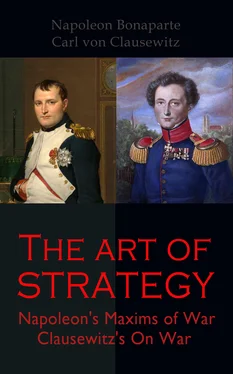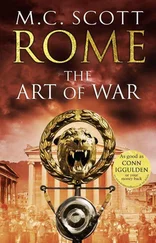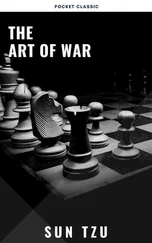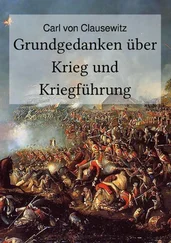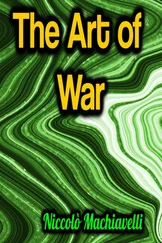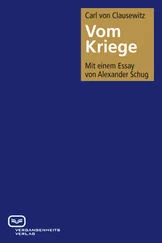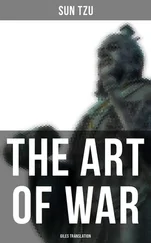40. THIS EXPLAINS THE RAPID GROWTH OF GREAT GENERALS, AND WHY A GENERAL IS NOT A MAN OF LEARNING.
This result of our considerations is in fact so necessary, any other would have made us distrustful of their accuracy. Only thus is explained how so often men have made their appearance with great success in War, and indeed in the higher ranks even in supreme Command, whose pursuits had been previously of a totally different nature; indeed how, as a rule, the most distinguished Generals have never risen from the very learned or really erudite class of officers, but have been mostly men who, from the circumstances of their position, could not have attained to any great amount of knowledge. On that account those who have considered it necessary or even beneficial to commence the education of a future General by instruction in all details have always been ridiculed as absurd pedants. It would be easy to show the injurious tendency of such a course, because the human mind is trained by the knowledge imparted to it and the direction given to its ideas. Only what is great can make it great; the little can only make it little, if the mind itself does not reject it as something repugnant.
41. FORMER CONTRADICTIONS.
Because this simplicity of knowledge requisite in War was not attended to, but that knowledge was always jumbled up with the whole impedimenta of subordinate sciences and arts, therefore the palpable opposition to the events of real life which resulted could not be solved otherwise than by ascribing it all to genius, which requires no theory and for which no theory could be prescribed.
42. ON THIS ACCOUNT ALL USE OF KNOWLEDGE WAS DENIED, AND EVERYTHING ASCRIBED TO NATURAL TALENTS.
People with whom common sense had the upper hand felt sensible of the immense distance remaining to be filled up between a genius of the highest order and a learned pedant; and they became in a manner free-thinkers, rejected all belief in theory, and affirmed the conduct of War to be a natural function of man, which he performs more or less well according as he has brought with him into the world more or less talent in that direction. It cannot be denied that these were nearer to the truth than those who placed a value on false knowledge: at the same time it may easily be seen that such a view is itself but an exaggeration. No activity of the human understanding is possible without a certain stock of ideas; but these are, for the greater part at least, not innate but acquired, and constitute his knowledge. The only question therefore is, of what kind should these ideas be; and we think we have answered it if we say that they should be directed on those things which man has directly to deal with in War.
43. THE KNOWLEDGE MUST BE MADE SUITABLE TO THE POSITION.
Inside this field itself of military activity, the knowledge required must be different according to the station of the Commander. It will be directed on smaller and more circumscribed objects if he holds an inferior, upon greater and more comprehensive ones if he holds a higher situation. There are Field Marshals who would not have shone at the head of a cavalry regiment, and vice versa .
44. THE KNOWLEDGE IN WAR IS VERY SIMPLE, BUT NOT, AT THE SAME TIME, VERY EASY.
But although the knowledge in War is simple, that is to say directed to so few subjects, and taking up those only in their final results, the art of execution is not, on that account, easy. Of the difficulties to which activity in War is subject generally, we have already spoken in the first book; we here omit those things which can only be overcome by courage, and maintain also that the activity of mind, is only simple, and easy in inferior stations, but increases in difficulty with increase of rank, and in the highest position, in that of Commander-in-Chief, is to be reckoned among the most difficult which there is for the human mind.
45. OF THE NATURE OF THIS KNOWLEDGE.
The Commander of an Army neither requires to be a learned explorer of history nor a publicist, but he must be well versed in the higher affairs of State; he must know, and be able to judge correctly of traditional tendencies, interests at stake, the immediate questions at issue, and the characters of leading persons; he need not be a close observer of men, a sharp dissector of human character, but he must know the character, the feelings, the habits, the peculiar faults and inclinations of those whom he is to command. He need not understand anything about the make of a carriage, or the harness of a battery horse, but he must know how to calculate exactly the march of a column, under different circumstances, according to the time it requires. These are matters the knowledge of which cannot be forced out by an apparatus of scientific formula and machinery: they are only to be gained by the exercise of an accurate judgment in the observation of things and of men, aided by a special talent for the apprehension of both.
The necessary knowledge for a high position in military action is therefore distinguished by this, that by observation, therefore by study and reflection, it is only to be attained through a special talent which as an intellectual instinct understands how to extract from the phenomena of life only the essence or spirit, as bees do the honey from the flowers; and that it is also to be gained by experience of life as well as by study and reflection. Life will never bring forth a Newton or an Euler by its rich teachings, but it may bring forth great calculators in War, such as Condé or Frederick.
It is therefore not necessary that, in order to vindicate the intellectual dignity of military activity, we should resort to untruth and silly pedantry. There never has been a great and distinguished Commander of contracted mind, but very numerous are the instances of men who, after serving with the greatest distinction in inferior positions, remained below mediocrity in the highest, from insufficiency of intellectual capacity. That even amongst those holding the post of Commander-in-Chief there may be a difference according to the degree of their plenitude of power is a matter of course.
46. SCIENCE MUST BECOME ART.
Now we have yet to consider one condition which is more necessary for the knowledge of the conduct of War than for any other, which is, that it must pass completely into the mind and almost completely cease to be something objective. In almost all other arts and occupations of life the active agent can make use of truths which he has only learnt once, and in the spirit and sense of which he no longer lives, and which he extracts from dusty books. Even truths which he has in hand and uses daily may continue something external to himself, If the architect takes up a pen to settle the strength of a pier by a complicated calculation, the truth found as a result is no emanation from his own mind. He had first to find the data with labour, and then to submit these to an operation of the mind, the rule for which he did not discover, the necessity of which he is perhaps at the moment only partly conscious of, but which he applies, for the most part, as if by mechanical dexterity. But it is never so in War. The moral reaction, the ever-changeful form of things, makes it necessary for the chief actor to carry in himself the whole mental apparatus of his knowledge, that anywhere and at every pulse-beat he may be capable of giving the requisite decision from himself. Knowledge must, by this complete assimilation with his own mind and life, be converted into real power. This is the reason why everything seems so easy with men distinguished in War, and why everything is ascribed to natural talent. We say natural talent, in order thereby to distinguish it from that which is formed and matured by observation and study.
Читать дальше
